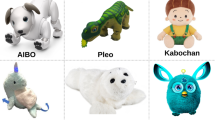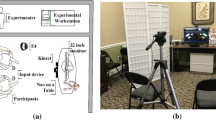Abstract
Worldwide, there are approximately 10 million new cases of dementia reported each year. Due to cognitive deficits, persons living with dementia (PLWDs) have lower independence and decreased quality of life at home. Physically-embodied socially assistive robots (SARs) have the potential to engage PLWDs and assist them in their home-based activities. However, limited attention has been given to the development and assessment of SAR to interact with PLWDs within the context of home-based activities. In this case study, we designed a list of activities, including entertainment, playing games, and ten activities of daily living in a simulated home setting. We invited one older adult (female) without cognitive impairment and two (male) with dementia to perform these activities with the guidance of a humanoid SAR. The results of our observational study demonstrate that the multimodal interaction in SARs, such as verbal communication, eye contact, and gestures, can greatly facilitate the adoption and use of SARs by PLWDs. We found that PLWDs attributed human-like qualities to the robot when performing home-based activities. We also identified main challenges in SAR to assist PLWDs with these tasks.
Supported in part by National Institute of Health under the grant number R01AG077003 and Student/Faculty Research Award from the University of Tennessee, Knoxville.
Access this chapter
Tax calculation will be finalised at checkout
Purchases are for personal use only
Similar content being viewed by others
References
Association, A.: 2022 Alzheimer’s disease facts and figures. Alzheimers Dement 18(4), 700–789 (2022)
Wang, R.H., Sudhama, A., Begum, M., Huq, R., Mihailidis, A.: Robots to assist daily activities: views of older adults with Alzheimer’s disease and their caregivers. Int. Psychogeriat. 29(1), 67–79 (2017)
Yuan, F., Klavon, E., Liu, Z., Lopez, R.P., Zhao, X.: A systematic review of robotic rehabilitation for cognitive training. Front. Robot. AI 8, 605715 (2021)
Yuan, F., et al.: Assessing the acceptability of a humanoid robot for Alzheimer’s disease and related dementia care using an online survey. International Journal of Social Robotics, pp. 1–15 (2022)
Ghafurian, M., Hoey, J., Dautenhahn, K.: Social robots for the care of persons with dementia: a systematic review. ACM Trans. Human-Robot Interact. (THRI) 10(4), 1–31 (2021)
Yuan, F., Bray, R., Oliver, M., Duzan, J., Crane, M., Zhao, X.: A social robot-facilitated performance assessment of self-care skills (2022)In: submitted to IEEE Robotics and Automation Magazine on May 1 (2022)
Chisholm, D., Toto, P., Raina, K., Holm, M., Rogers, J.: Evaluating capacity to live independently and safely in the community: performance assessment of self-care skills. British J. Occup. Therapy 77(2), 59–63 (2014)
Begum, M., Huq, R., Wang, R., Mihailidis, A.: Collaboration of an assistive robot and older adults with dementia. Gerontechnology 13(4), 405–419 (2015)
Heerink, M., Kröse, B., Evers, V., Wielinga, B.: Assessing acceptance of assistive social agent technology by older adults: the almere model. Int. J. Social Robot. 2(4), 361–375 (2010)
Beuscher, L.M., et al.: Socially assistive robots: measuring older adults’ perceptions. J. Gerontol. Nurs. 43(12), 35–43 (2017)
Moharana, S., Panduro, A.E., Lee, H.R., Riek, L.D.: Robots for joy, robots for sorrow: community based robot design for dementia caregivers. In: 2019 14th ACM/IEEE International Conference on Human-Robot Interaction (HRI). pp. 458–467. IEEE (2019)
Görür, O.C., Rosman, B., Sivrikaya, F., Albayrak, S.: Social cobots: Anticipatory decision-making for collaborative robots incorporating unexpected human behaviors. In: Proceedings of the 2018 ACM/IEEE International Conference on Human-Robot Interaction, pp. 398–406 (2018)
Woods, D., Yuan, F., Jao, Y.-L., Zhao, X.: Social robots for older adults with Dementia: a narrative review on challenges and future directions. In: Li, H., et al. (eds.) ICSR 2021. LNCS (LNAI), vol. 13086, pp. 411–420. Springer, Cham (2021). https://doi.org/10.1007/978-3-030-90525-5_35
Author information
Authors and Affiliations
Corresponding author
Editor information
Editors and Affiliations
Rights and permissions
Copyright information
© 2022 The Author(s), under exclusive license to Springer Nature Switzerland AG
About this paper
Cite this paper
Yuan, F. et al. (2022). Assessment of a Humanoid Partner for Older Adults and Persons with Dementia During Home-Based Activities. In: Cavallo, F., et al. Social Robotics. ICSR 2022. Lecture Notes in Computer Science(), vol 13818. Springer, Cham. https://doi.org/10.1007/978-3-031-24670-8_52
Download citation
DOI: https://doi.org/10.1007/978-3-031-24670-8_52
Published:
Publisher Name: Springer, Cham
Print ISBN: 978-3-031-24669-2
Online ISBN: 978-3-031-24670-8
eBook Packages: Computer ScienceComputer Science (R0)




